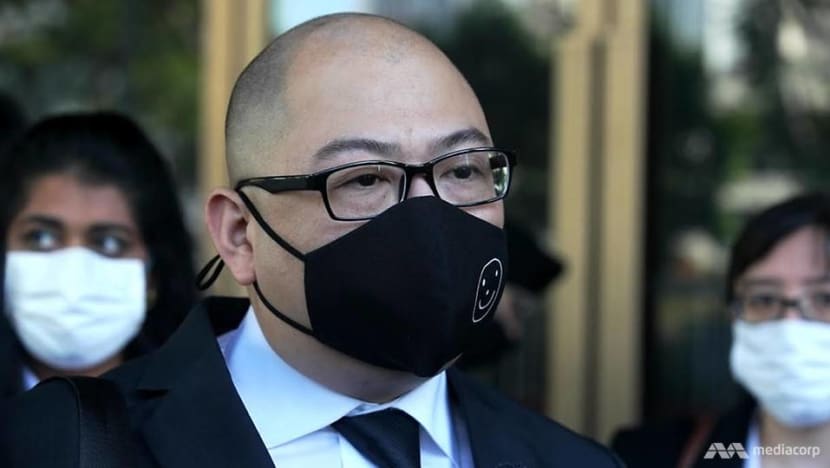No additional jail term or fine for Online Citizen chief editor Terry Xu: High Court
Terry Xu had his three-week jail term reduced to a fine upon appeal, but the prosecution still argued for Xu to serve the in-default jail term or pay the fine even though Xu had already completed his sentence.

Mr Terry Xu, the editor of The Online Citizen, was questioned by Prime Minister Lee Hsien Loong's personal lawyer on Dec 1, 2020. (Photo: TODAY/Nuria Ling)
SINGAPORE: The chief editor of the alternative news website The Online Citizen will not have to serve an in-default jail term or pay a fine after his original jail term was replaced with a fine, the High Court ruled on Friday (Aug 4).
Terry Xu Yuanchen was initially handed a three-week jail term for criminal defamation, which he had served, before his jail term was replaced with a fine of S$8,000 (US$5,960) upon a successful appeal on May 4.
Xu was found guilty in November 2021 of defaming members of the Cabinet of Singapore for approving the publication of a letter in September 2018 that alleged "corruption at the highest echelons". The Online Citizen has since rebranded to The Online Citizen Asia, and Xu is in Taiwan, according to his lawyer Remy Choo Zheng Xi.
Upon Xu's appeal, Justice Aedit Abdullah found the three-week jail term "manifestly excessive" and reduced it to a S$8,000 fine. He then fixed a further hearing for Mr Choo to confirm if Xu would have the time he had served to be taken as the two weeks' jail in default for the S$8,000 fine, or if Xu wanted to pay the fine.
On Friday, the prosecution, represented by Deputy Public Prosecutors Mohamed Faizal, Andre Chong and Niranjan Ranjakunalan argued that Xu should serve the two-week jail term in default of the S$8,000 fine, or pay the fine.
In written submissions, the prosecution argued that it was "not legally permissible for the in-default sentence to be satisfied by relying on the prior imprisonment sentence".
"If the appellant is unwilling to pay the fine that had been imposed, he must serve the in-default sentence in full, notwithstanding the fact that he elected to serve the prior imprisonment sentence prior to his appeal," the prosecution said.
They argued that there were two crucial aspects to the in-default sentence that serving an earlier jail term could not satisfy.
These were that an in-default sentence was imposed to prevent evasion of the fine imposed, and that an in-default sentence only takes effect upon the offender's failure to pay the fine imposed.
Given this, it was plain that serving an earlier jail term before a fine is imposed could never satisfy the in-default sentence that came with such a fine, the prosecution urged.
They further submitted that an in-default sentence cannot be backdated, as such a sentence was only triggered at the time the offender indicates his inability or unwillingness to pay the fine.
"To allow the backdating of an in-default sentence in this manner would undermine the very purpose of the power, which is to prevent the evasion of a fine, rather than to punish the offender," they said in submissions.
The prosecution also noted that Xu had deliberately chosen to serve his original jail term despite being warned about this situation.
"Indeed, he elected to serve the prior imprisonment sentence in spite of being warned explicitly by (the prosecution) of the potential eventuation of an outcome identical to the circumstances presently before this Court," said the prosecution.
Producing records, the prosecution pointed out that Xu had made an informed decision not to apply for bail pending appeal, unlike his co-accused Daniel De Costa Augustin.
De Costa, who had written the letter found to be criminally defamatory, had his jail term of three weeks replaced with a fine of S$10,000 upon appeal.
The present situation was entirely of Xu's "own making" and therefore he should "have little cause for complaint", the prosecution said.
In rebuttal, Mr Choo said that it would be excessive to have his client serve the in-default jail term in addition to his original sentence.
He referred to a section of the Criminal Procedure Code, which stated that a court must consider all the circumstances of the case before directing the date on which a sentence of imprisonment takes effect.
Delivering his oral remarks, Justice Abdullah said: "Any member of the public would be surprised, I think, that the three weeks previously served does not count, and that the appellant remains liable to either serve two weeks’ imprisonment, piled on top of the previous three weeks, or pay S$8,000, or be subject to enforcement for that S$8,000.
"The reduction of sentence imposed by the court in effect makes his punishment more severe: The appellant would have been better off had he lost his appeal."
Noting a gap in the law for with regards to this specific issue, Justice Abdullah said justice required that he adopted a procedure that took into account the previously served jail term.
Xu's choice to serve the sentence imposed at that time should not lead to an injustice, he added.
"Accordingly, I rule that the previously served sentence should be treated as going towards the default sentence imposed on the appellant, and thus nothing remains to be served or paid under the sentence I pronounced in the appeal by the appellant."














